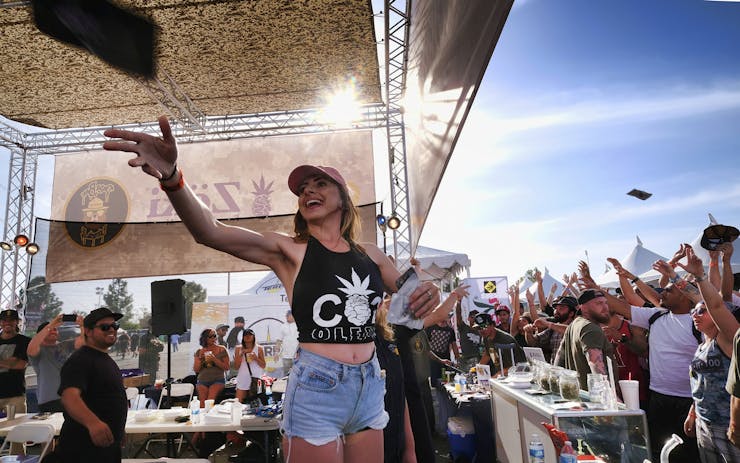Go to a California cannabis event and you’re likely to walk away with a free hat—or a bumper sticker, or a t-shirt, or tote bag emblazoned with a cannabis company’s logo. But under a bill being considered in the state Legislature, all that branded merchandise would go up in smoke.
Senate Bill 162, by state Sen. Ben Allen (D-Santa Monica), would prohibit state-licensed cannabis businesses from advertising “through the use of branded merchandise, including, but not limited to, clothing, hats, or other merchandise with the name or logo of the product.” It’s a measure aimed at reducing children’s exposure to cannabis ads, but some in the industry say it amounts to legislative overreach and could end up doing more harm than good.
Last month the Senate passed the measure unanimously, 40–0. On Tuesday, the Assembly’s Business and Professions Committee passed it 12–0, sending it on to the Assembly Appropriations Committee.
Advertising has been a thorny issue as the Golden State works to bring its multibillion-dollar cannabis industry out of the shadows and into a legal, regulated marketplace. Concerns over advertisements that might appeal to minors have already led to restrictions on the use of certain music, language, shapes, cartoon characters, and other content known to capture kids’ attention. In addition to staying away from schools, daycares, and youth centers, advertisements can be served only to audiences that are at least 71.6% composed of adults 21 and over.
“SB 162’s restriction on 'advertising' generally would give enforcement authorities the ability to shut down all cannabis merchandising.”
Branded merchandise is also currently restricted, with distribution allowed only at “an industry trade show or other similar venue where the attendees are required to be 21 years of age or older.” SB 162 would remove that allowance, barring branded merchandise completely.
As written, the law would apply only to commercial speech by state-licensed cannabis companies. Nonprofits and noncommercial speech would be exempt.
The proposal, as LA Weekly’s Dennis Romero reports, has some cannabis businesses up in arms:
The Southern California Coalition, the largest trade group of marijuana businesses in Los Angeles, is … opposed to the proposal. “To ban small businesses from advertising, marketing and branding is ridiculous,” the organization’s executive director, Adam Spiker, said via email.
“The bill would materially hamstring small business owners’ ability to grow in the land of opportunity,” Spiker said. “We are firmly against it, and will work to ensure lawmakers are aware of the harmful ramifications it would have.”
A letter sent to Sen. Allen by the California arm of the American Academy of Pediatrics says the bill “would ensure that children and youth are exposed to a minimal amount of marijuana advertising,” according to the LA Weekly report. “This would help protect children from the dangerous health effects of marijuana use in a manner consistent with tobacco regulations.”
The limits of the bill’s restrictions on merchandise aren’t immediately clear. In other legal states, employees of cannabis businesses regularly wear branded apparel and other merchandise. But because the law is phrased so broadly—”advertise through the use of”—it’s conceivable that even branded bags or employee t-shirts could run afoul of the proposed law.
“SB 162 is broad enough in its language that it could cover branded merchandise worn by employees or even merchandise produced by an unlicensed third party if it was done so for the licensee,” said Rebecca Stamey-White, a San Francisco-based lawyer who works with the cannabis and alcohol industries.
Other states, such as Washington, have similar restrictions on branded merchandise, although the details are more clearly defined. According to a Washington State Liquor and Cannabis Board FAQ page, licensees may create branded merchandise such as apparel for internal or employee use. Those items can’t be sold or given away directly to consumers, but they can be sold by the licensee’s parent company or a separate-but-related business. Strangely enough, branded paraphernalia—such as pipes, bongs, and storage containers—is not considered “branded merchandise” in Washington and may be sold by licensees.
“The [California] bill does not have the appropriate limitations that Washington has on their restrictions, which only prevent licensees from selling or giving away branded products from their licensed premises or on their website, but makes no attempt to regulate non-licensees producing or selling these products,” Stamey-White said. “SB 162’s restriction on ‘advertising’ generally would give enforcement authorities the ability to shut down all cannabis merchandising, including all kinds of branded products that do not contain cannabis, so this is a bill the industry should be actively opposing or working toward more precise language here.”
In Colorado, cannabis laws don’t discuss branded products specifically. Instead, restrictions on advertising focus on “mass market campaigns that have a high likelihood of reaching” minors, including internet and in-app advertising.
Advertisements for alcohol, a substance directly or indirectly responsible for thousands of youth deaths every year, are allowed considerably more leeway under the law. “Restrictions on consumer alcohol merchandising are limited to what products may be given away to consumers, but there are not blanket prohibitions on the sale of branded products or restrictions on where these products can be sold as advertising,” Stamey-White said.
Shop highly rated dispensaries near you
Showing you dispensaries near“This bill is an attempt to restrict commercial free speech without a substantial state interest in doing so,” she added. “I believe in restrictions on overly aggressive marketing (which is the constraint on giveaways) and marketing that is appealing to minors, but I think this goes too far.”
The full text of SB 162 is available on the California Legislature’s website.




